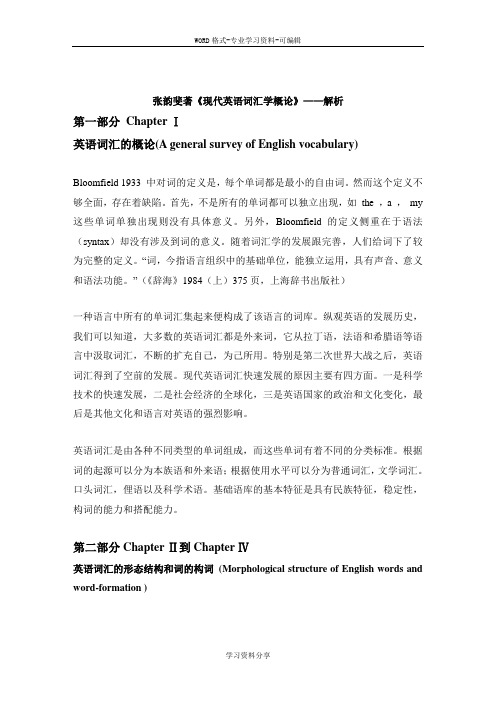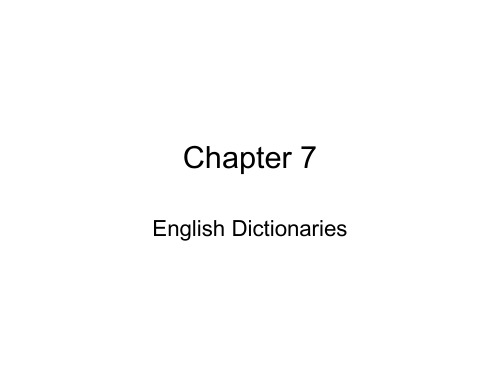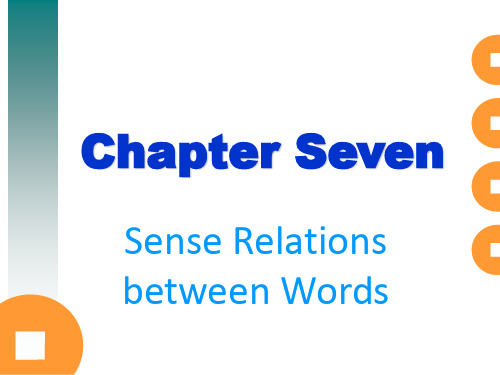现代英语词汇学概论chapter7
英语专业词汇学第7章

• •
More Examples:
Feature deletion can also be applied to verbs. e.g.
such verbs as kill yields die, teach yields learn, feed yields eat, show yields see, etc. The deletion of the feature [+Volitive] from the verb listen yields hear, look yields see respectively. It should be noted that feature-deletion takes precedence over feature-additon.
Other frequent single-feature contrasts include:
B. The Feature-deletion and Feature-addition Rules
These are rules that either delete features from, or add features to, the end of the feature list. e.g. Deletion of features generally produces superordinates, like fruit from apple, Addition of features produces subordinates, like apple from fruit.
• On the lexical level, paradigmatic contrasts indicate which words
现代英语词汇学

2) 结构方式不同, 表达的意义相反。 He dissented from the decision. He assented to the decision. His illness disabled him from pursuing his study. His recovery enabled him to pursue his study.
第七章:词的联想与搭配
防暴警察 riot police, 特困生: the most needy students 寒衣 warm clothes; 太平门 emergency exit; 自学 self-taught
候机室: departure lounge ; 昼夜服务: round-the-clock service; 未经许可车辆不得入内 authorized cars only; 顾客止步 Employees Only; 消防队 fire brigade,
第七章:词的联想与搭配
4. 范畴保持规则(the categoryPreservation Rules) 范畴保持规则,即尽可能保持词的范畴(词性)不 变。
Clark 认为这是一条消极规则即不改变词的语义特 征的最高部分。如名词或形容词的特征。 Do not change features high on the list, such as the feature [+noun] or [+adjective] 次范畴特征也要保持。 Frighten [+verb]..[+- NP]
第七章:词的联想与搭配
III. 联想与搭配的运用
He sweated profusely. Blood flew copiously. He drew heavily on the book. criticize roundly(严厉地批评) smile faintly(淡然一笑) smile broadly (笑逐颜开) fondly hope (妄想) guard jealously (警惕地保卫)
英语词汇学第七章

第七章词汇:modes n. 模式elevation 提高shrinking v. 萎缩amelioration n. 改进humble adj. 谦逊的;简陋的;(级别或地位)低下的;不大的pejoration n. 恶化;堕落;语义的转贬derogatory adj. 贬损的Analogy 比拟要点:一.Vocabulary is the most unstable element of a language as it isunder-going constant changes both in form and content.The content is even more unstable than the forms.Word-meaning changes by modes isextension, narrowing, degradation, elevation and transfer. of these, extensionand narrowing are by far the most common.二.1.Extension (generalization)--is a term referring to the widening of meaning. It is a pro cess by which a word,which originally had a specialized meaning, has now become generalized.(Word old meaning now meaningManuscript handwriting :any author‘s writing whether written by hand or typed with a type-writer or a word-processorFabulous resembling:a fable incredible, marvelousBarn :a place for storing only barley storeroomPicture painting include "drawings" and even "photographs".Mill place for grinding into flour place where things are ma deJournal daily paper periodicalButcher one who kills goats one who kills animalsCompanion one who shares bread a company·. A large proportion of polysemic words of modern English have their meanings extended sometimes in the course of development. Some words are generalized to such an extent that they can mean almost anything.Word old meaning now meaningThing a public assembly or a council anythingBusiness, concern, condition, matter, article, circumstance ·.Technical termsWord old meaning now meaningAlibi (a legal term) plea that the accused is not at the place excuseWhen the crime is committedAllergic (a medical term) too sensitive to medicine averse or disinclined toFeedback (computer term) response ·.From proper nounsWord old meaning now meaningLynch the Lynch‘s Law kill without lawful trialSandwish a gambler‘s name to denote a kind of fast place or squeeze betweenFood Vandal a member of an East Germanic tribe malicious destruction of a thingA person of such behaviourV. vandalize Adj. Vandalic/vandalistic n. vandalization/vandalism2. Narrowing (specialization) --is a term referring to the shrinking of meaning. It is a proc ess by which a word ofwide meaning acquires a narrower or specialized sense.Word old meaning now meaningDeer animal Corn grain maize Garage any safe place a place for storing carsLiquor liquid alcoholic drinkDisease discomfort illnessPoison drink poisonous drinkWife woman a married womanAccident event unfortunate eventGirl young person of either sex female young person.Turn into a proper nounsThe City business center of LondonThe Peninsula Iberian PeninsulaThe Prophet Mohammed.For economy, some phrases are shortened and only one element of the original is left t o retain the meaning ofthe whole.e.g. a private = a private solidera general = a general officeran editorial = an editorial article.Material nounsWord old meaning now meaningSilver silver dollarsGlass cup-like container or mirrorIron device for smoothing clothes3.Elevation or amelioration--refers to the process by which words rise from humble beg innings to positions ofimportance.Word old meaning now meaningNice ignorant --- foolish delightful, pleasantMarshal / constable keeper of horses high-ranking army officer / policemenAngle messenger messenger of GodKnight servant rank below baronetEarl men countGovernor pilot head of a stateFond foolish affectionateMinister servant head of ministryShrewd evil, wickedness smartNimble be good at taking things without permission smartChamberlain servant high official of royal courtsSuccess result4. Degradation or pejoration of meaning --It is a process whereby words of good origin fall into ill reputation ornon-affective words come to be used in derogatory sense.Word old meaning now meaningBoor peasant rude, ill-mannered personChurl peasant / free man uncultivated or mean personWench country girl prostituteHussy housewife woman of low moralsVillain person who worked in a villa evil or wicked person or scoundrelSilly happy foolishKnave boy dishonest personLewd ignorant lecherousCriticize appraise find fault withLust pleasure sexual desire5. Transfer- words which were used to designate on thing but later changed to meansomething else.Word old meaning now meaningPaper an African plant papyrus·Associated transferE.g. the lip of a woundThe tongue of a bellThe nose of a planePurse for money, dish for food, glass for cup·Between abstract and concrete meaningWord old meaning now meaningAftermath second crop of grass after mowing consequence, resultHope e.g. Clinton is the hope of the family.·Between subject and objective meaningWord old meaning now meaningPitiful full of pity deserving pityDreadful / hateful subject meaning objective meaningFearful/ doubtful / suspicious subject and objective meaning·Transfer of sensationsE.g. clear-sounding (from sight to hearing)Loud colours (from hearing to sight)Sweet music (from taste to hearing)三.1. Extra-linguistic Factors1). Historical reason·A word is retained for a name though the meaning has changed because the reference has changed.Word old meaning now meaningPen featherCar two-wheel cart drown by horses and used automobile in warComputer person who computes electronic machine·Increased scientific knowledge and discovery are also important factorsWord old meaning now meaningSun the luminous heavenly body-one of the star around which the earth and other p lanets revolveseven planets revolving around the earthAtom any of the indivisible particles not the smallest and can be divided into evensmaller particles2). Class reaso n. Language is just like a mirror, reflecting everything that exists inhuman society. It records the speech and attitude of different social classes.As a result, different social varieties of language have come into being.Word old meaning now meaningChurl, hussy, wench, villain ill-mannered or bad peopleDemocracy, revolution, liberalism, human rights, communism different meaning in different societies and to different people3). Psychological reason. The associated transfer of meaning and euphemistic use of words are often due to psychological factors. people change word-meaning owingto various psychological(slang). Religious influence isanother kind psychological need.Word old meaning now meaningCopperhead a venomous snake2. Linguistic factors1). ShorteningGold for gold medalGas for coal gasBulb for light bulbPrivate for private solider2).BorrowingDeer / animal / beastPig / pork, sheep / mutton, cattle / beefBird / fowl, dog / hound, boy / knave, chair / stool3). AnalogyFortuitous happening by chance, accident fortunateFruition a pleasure obtaining from using or possessing something。
《现代英语词汇学概论》----解析(张韵斐)

张韵斐著《现代英语词汇学概论》——解析第一部分Chapter Ⅰ英语词汇的概论(A general survey of English vocabulary)Bloomfield 1933 中对词的定义是,每个单词都是最小的自由词。
然而这个定义不够全面,存在着缺陷。
首先,不是所有的单词都可以独立出现,如the ,a ,my 这些单词单独出现则没有具体意义。
另外,Bloomfield的定义侧重在于语法(syntax)却没有涉及到词的意义。
随着词汇学的发展跟完善,人们给词下了较为完整的定义。
“词,今指语言组织中的基础单位,能独立运用,具有声音、意义和语法功能。
”(《辞海》1984(上)375页,上海辞书出版社)一种语言中所有的单词汇集起来便构成了该语言的词库。
纵观英语的发展历史,我们可以知道,大多数的英语词汇都是外来词,它从拉丁语,法语和希腊语等语言中汲取词汇,不断的扩充自己,为己所用。
特别是第二次世界大战之后,英语词汇得到了空前的发展。
现代英语词汇快速发展的原因主要有四方面。
一是科学技术的快速发展,二是社会经济的全球化,三是英语国家的政治和文化变化,最后是其他文化和语言对英语的强烈影响。
英语词汇是由各种不同类型的单词组成,而这些单词有着不同的分类标准。
根据词的起源可以分为本族语和外来语;根据使用水平可以分为普通词汇,文学词汇。
口头词汇,俚语以及科学术语。
基础语库的基本特征是具有民族特征,稳定性,构词的能力和搭配能力。
第二部分Chapter Ⅱ到Chapter Ⅳ英语词汇的形态结构和词的构词(Morphological structure of English words and word-formation )(一)词素(Morphemes)单词是有词素(morphemes)构成的。
词素即英语语言中有意义的最小单位,同时具有声音和意义。
单词可以有一个或一个以上的词素组成。
如:nation 是一个词素,national有nation+al 两个词素。
英语词汇学课件 Unit 7

7.1 Synonymy & synonym
7.1.1 Definition synonymy: the relation between two lexical units with a shared meaning. synonym: A word that is equivalent in sense to another word (in a particular context or contexts) E.g. select/choose • Will you help me choose a new suit? • I don’t choose to wait.
7.1.2 Classification
perfect/absolute synonyms Partial/relative synonyms
同义关系不仅存在于单个词之间,还可能存在于成语之间
decide to/make up one’s mind to/be determined to
7.1.3 Source of synonyms
7.1.4 Differentiation
denotative/conceptual meaning extend, increase, expand rich, wealthy; want, desire • • • • associative meaning answer / respond cop / policeman He is one of the greatest/biggest lyric poets in the world. Look at that lovely little/small/tiny boy.
E.g. rich/poor, big/small, husband/wife
英语词汇学Chapter 7dictionaries

7.1 Introduction
• • • • 3)内容安排 The organization The types The importance of corpora in dictionary making • Some English dictionaries
7.2 organization of the entry
7.5 types of dictionaries
• • • • • • 三大类: General and specialized dictionaries Monolingual and bilingual dictionaries Electronic and printed dictionaries 3) 其他的分类标准 On the basis of size, users and function
7.2.4 etymology
• 4) the use of abbreviation and signs • MD: middle English • < : derived from
7.2.5 definition
• • • • • 1) importance The heart of a dictionary 2) forms A) Description A sentence with less frequently used words • Limit the vocabulary in the description
• 1) 简介 • Corpus work in English began in the 1960’s with the development of the Survey of English Usage and the Brown University Corpus • By the 1990’s lexicographers could draw on massive resources such as the British National Corpus, the International Corpus of English, and the Bank of English.
7.现代英语词汇学(第七章)

with the stimulus. Stated in terms of semantic features, the rule would go as follows: “Change the sign of only one feature.” The word man, for example, hason with the word woman: [+Noun], [+Human], [+Adult]. But these two words differ in the last feature [+ Male]. If [+Male] is changed to [- Male], the stimulus man yields the response woman. The antonymous adjectives longshort elicit each other with a change of the feature [+ Polar]. Other frequent single-feature contrasts include [+ Plural] in verbs (is - are, was – were, has – have, etc.); [ + Past] among strong verbs (is – was, are- were, has- had, take- took, etc.) [+ Nominative] among pronouns (he- him, she- her, we- us, they- them, etc.); and [+ Proximal] among the deictic /daitik/ words (here-
英语词汇学7

2. Partial synonyms
★ Or relative synonyms or loose synonyms also
called near-synonyms are similar or nearly the same in denotation, but embrace different shades of meaning or different degrees of a given quality.
★Partial synonyms differ from complete synonyms in
the following respects:
(a) Difference in degree of a given quality or in shade of meaning (Synonyms with different connotation) e.g anger: the most general term rage: implies a loss of self control fury: The strongest word in the group, suggests a rage so violent that it may approach madness; indignation: denotes anger based on a moral condemnation of something felt to be wrong and unfair. wrath: now limited in use to literature and figures of speech, suggests a strong anger directed at some specific person or thing.
- 1、下载文档前请自行甄别文档内容的完整性,平台不提供额外的编辑、内容补充、找答案等附加服务。
- 2、"仅部分预览"的文档,不可在线预览部分如存在完整性等问题,可反馈申请退款(可完整预览的文档不适用该条件!)。
- 3、如文档侵犯您的权益,请联系客服反馈,我们会尽快为您处理(人工客服工作时间:9:00-18:30)。
2
• A dog is an animal that thinks it's human;
• A human is an animal that thinks it's not an animal; • Therefore, a dog is an animal that thinks it's an animal that thinks it's not an animal.
3
• Sense relations
– Polysemy – Homonymy(同形异义关系/同音异义关系/同音同形异义关系)
• Homophones Homographs Perfect homonyms
– Synonymy 同义关系
• semantic similarity
synonym 同义词 antomym 反义词
14
• Antonymy • Antonomy is concerned with semantic opposition. Antonyms can be defined as words which are opposite in meaning. There are a variety of „oppositeness‟. antonyms can be classified on the basis of
• 4) Coincidence with idiomatic expressions
make up one‘ s mind
9
Discrimination of Synonyms •The differences between synonyms boil down to three areas: denotation, connotation, and application.
13
absurd, ridiculous, silly – It is ridiculous to judge a foreign culture only by its food. absurd – There was an idea that the earth was flat and motionless. silly – You were very to trust him. accuse, charge, rebuke – The boss rebuked him strongly for his negligence – The police accused him of theft. – The police charged him with murder.
– Rare, non-existent – Absolute synonyms are restricted to highly specialized vocabulary, such as scarlet-fever/ scarlatina in medicine,
6
• 2) Relative synonyms, also called near-synonyms, are similar or nearly the same in denotation, but embrace different shades of meaning or different degrees of a given quality.
• Contraries/ Gradable 相对反义词 • Complementaries 互补反义词 • Conversives 换位反义词
12
Exercises
• Discrimination of synonyms abolish, cancel, extinguish, eliminate eliminated – The losing team was from further competition. – Firefighters a big fire. extinguished – The meeting has been because of the cancelled flu. – The government the tax on alcohol. abolished
– Or exactly one of two or more words which have the same or very nearly the same essential meaning.
5
ቤተ መጻሕፍቲ ባይዱ
Types of Synonyms • Synonyms can be classified into two major groups: absolute/complete synonyms and relative synonyms. • 1) absolute/complete synonyms, also known as complete synonyms are words which are identical in meaning in all its aspects, i.e. both in grammatical meaning and lexical meaning, including conceptual and associative meanings.
– Antonymy 反义关系
• semantic opposition
– Hyponymy 上下义关系
• semantic inclusion
4
Synonymy
• Synonymy is a relationship of „sameness of meaning‟ that may hold between two words. • Synonym: a word that means the same as another.
– 1) Difference in denotation
• Synonyms may differ in the range and intensity of meaning. Some words have a wider range of meaning than others.
– comprehend / understand – extend / increase / expand – laugh: chortle, chuckle, giggle, guffaw, snicker/snigger, titter
A man changes his habits, alters his conduct, and varies his manner of speaking
–
7
• Relative synonyms may be different in the following aspects:
– – – – In degree of a given quality or in shade of meaning; In affective meaning, and stylistic meaning; In collocation and distribution; Some sets of synonyms belong to different dialects of the language
• 2) Dialects and regional English
• railway (BrE) railroad (AmE)
• 3) Figurative and euphemistic use of words
• occupation (profession)
• decide
walk of life (fig)
Chapter VII
SENSE RELATIONS BETWEEN WORDS
1
• Words are arbitrary symbols and independent identities so far as their outer facet--- spelling and pronunciation, is concerned. But semantically, all words are related in one way or another. A word which is related to other words is related to them in sense, hence sense relations. • Moreover, the discussion will also cover semantic field, which is commonly felt to be an integral part of sense relations
8
• Sources of Synonyms
• 1) Borrowing
– “ the richness of English in synonyms is largely due to the happy mingling of Latin, French and native elements.”(Baugh, 1978) • Native French Latin • ask question interrogate • fast firm secure
A. semantic contrast B. morphological structure
15
types of antonyms
• Morphological classification
• root antonyms • derivational antonyms
• Semantic classification
– – – – unlike / dissimilar homely / domestic Look at that lovely little boy. Look at that small boy. Look at that tiny boy.
